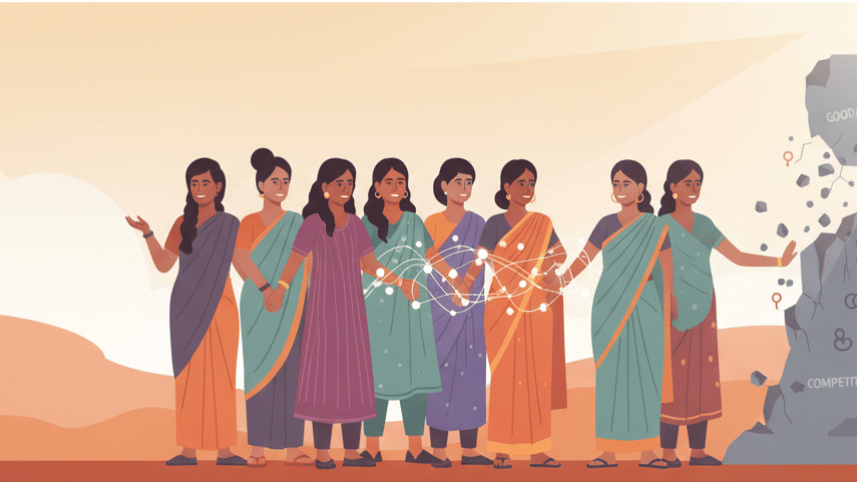Don’t pit women against each other

Every so often, someone leaves a comment under one of my posts, thinking they are paying me the highest compliment: "You're not like other girls." If not that, they belittle other women, hoping to see me join the slander.
What I actually do is block them. Instantly.
And then I wonder: what is "other girls"? Who are these mythical women you think you know well enough to dismiss? Have you met all the "other girls" in the world to make that sweeping claim?
I am not separate from the others. Maybe we are all similar in some ways, while completely different in other ways. This is what being human means. Women are not a monolith. They are as varied as snowflakes, fingerprints, galaxies—each one distinct, each one dazzling in her own way. And that is why this phrase feels like poison disguised as perfume. It is not really about an individual at all. It's about a society that survives by pitting women against one another. Here in South Asia, we have almost turned that into an Olympic sport.
We are raised on a binary: there are "good women" and "bad women." Good women are obedient, quiet, selfless. They keep their heads down and their voices soft. They don't dress too boldly, they don't argue, they don't choose themselves over others.
Bad women, well, they do everything "good women" don't.
And so, we grow up with this choice carved into us like scripture: be good, or be punished. Be the ideal daughter, the perfect wife, the sacrificial mother, or be branded dangerous, shameless and dishonourable.
And here's the bitter twist: it is often women who teach us this first. Mothers, aunts, neighbours, teachers—the women who raise us are the ones who whisper warnings about "girls like her." They tell us not to be too ambitious, dress "like that," laugh too loudly, and want too much.
This is how patriarchy stays alive, not just through men who benefit from it, but through women who enforce it.
There is a unique pain in being shamed, silenced, or belittled by another woman. You expect solidarity and find surveillance instead; you expect a sister and meet a warden.
But this isn't a coincidence. Generations of women have been told that their safety, their status, even their very survival, depend on how well they police themselves and others. If they follow the rules, maybe they'll be spared humiliation, violence and abandonment. And so, some become guardians of the very system that hurts them, because challenging it feels too dangerous.
This is where the "pick me" culture comes from: women who declare, loudly, that they are "not like the rest." They won't complain, they won't make demands—they are "different." But that difference doesn't shield them from the shackles of patriarchy.
The truth is simple, albeit painful: men are not the only obstacle to equality. Women who cling to patriarchal values are some of its fiercest defenders.
Every time a woman mocks another for leaving a marriage, she reinforces the idea that women must suffer silently. Every time a mother teaches her son entitlement and her daughter compromise, she builds the next generation of inequality. Every time a woman calls a survivor a liar or excuses an abuser, she keeps the abusive system intact. Every time a woman polices another's clothing, she emboldens men who believe sexual harassment is justified.
This is the quiet violence that doesn't leave bruises. It just leaves women doubting each other, mistrusting each other, competing with each other, all to the benefit of the very system generations of us have been fighting to dismantle.
We cannot tear down a system designed to pit us against each other by continuing to play along. Every time we smile at the phrase "not like other girls," we accept a ranking system that devalues half of humanity.
But what if we refused? What if we made sisterhood, not rivalry, the default? What if we stopped competing for scraps of approval and started building a table where every woman has a seat?
Because the future is not built on the backs of women who betray each other for a little borrowed respect. The future is all of us, together, tearing down the walls that told us we had to compete in the first place.
And when we do, there will be no "other girls" left—just women, whole and unbroken, standing shoulder to shoulder. And that, sisters, is the dream.
Naziba Basher is a journalist at The Daily Star.
Views expressed in this article are the author's own.
Follow The Daily Star Opinion on Facebook for the latest opinions, commentaries and analyses by experts and professionals. To contribute your article or letter to The Daily Star Opinion, see our guidelines for submission.




 For all latest news, follow The Daily Star's Google News channel.
For all latest news, follow The Daily Star's Google News channel. 

Comments